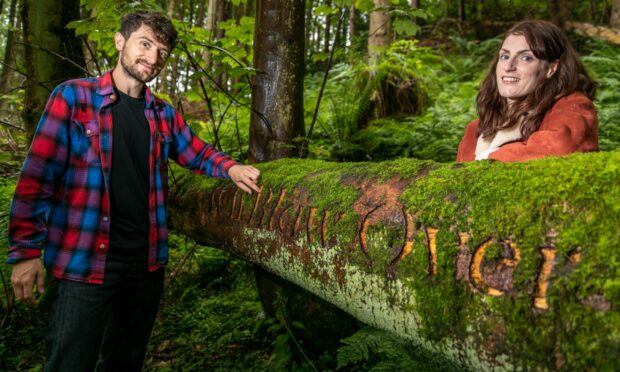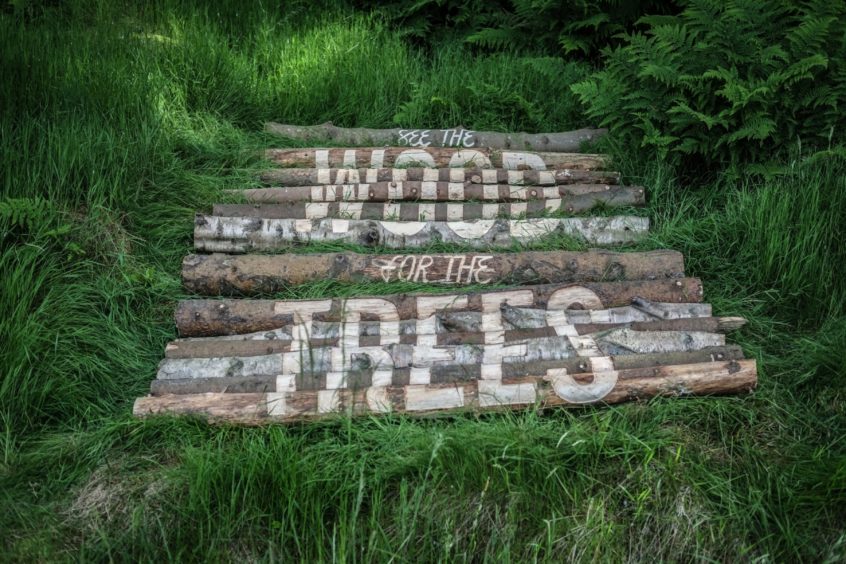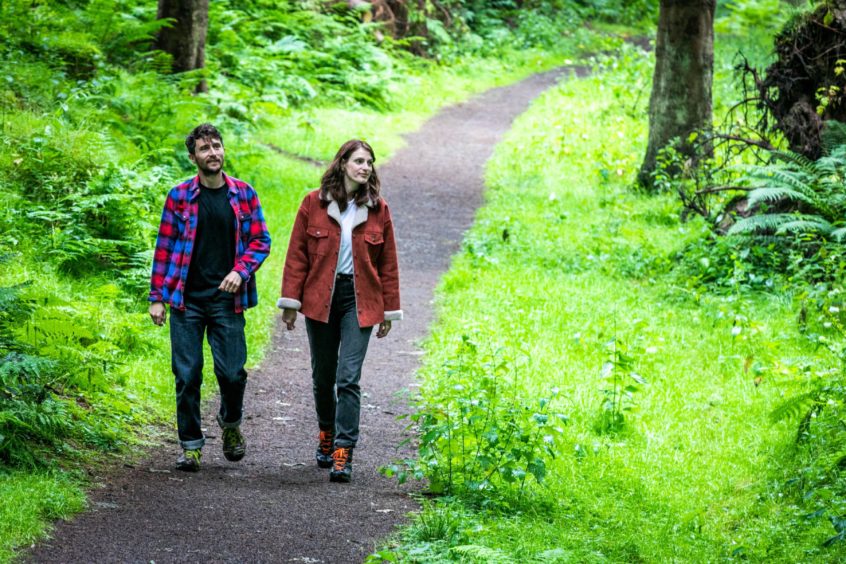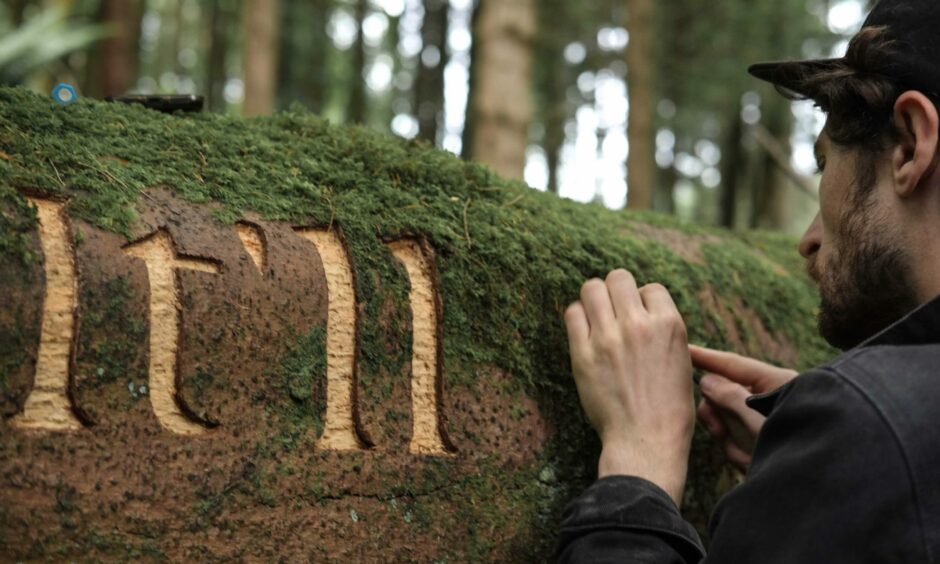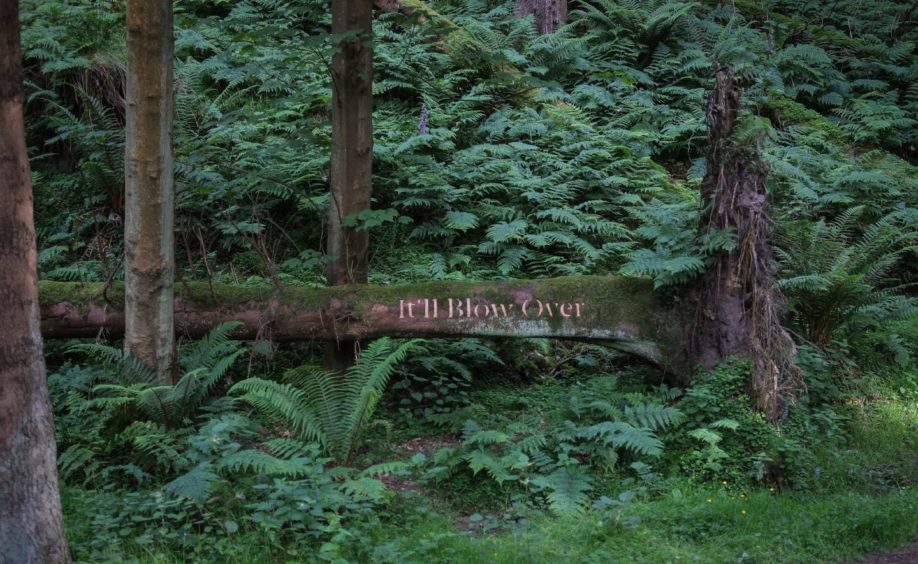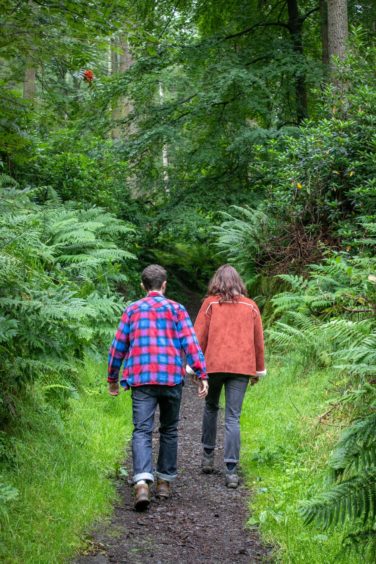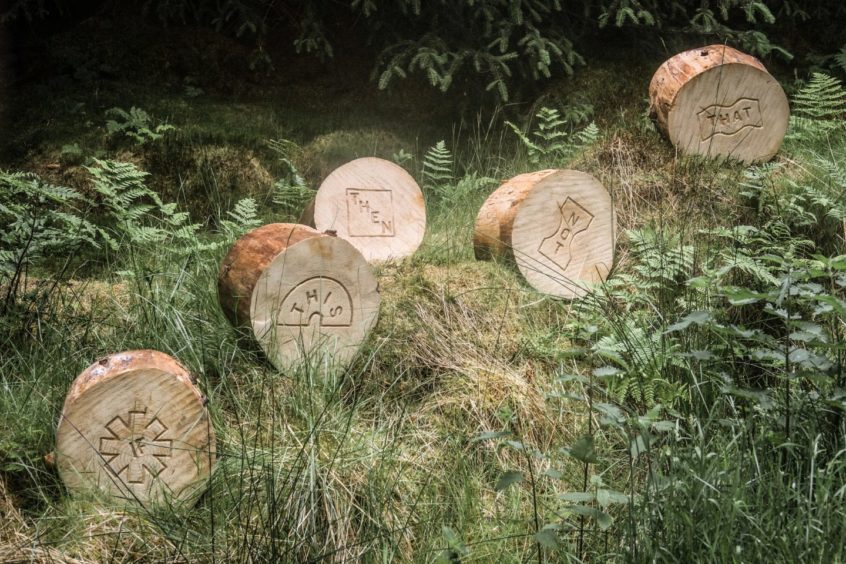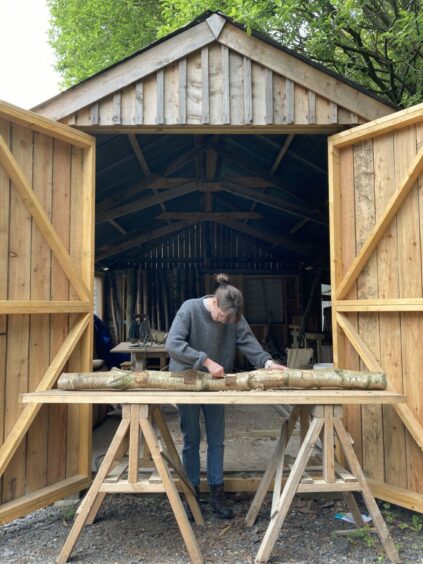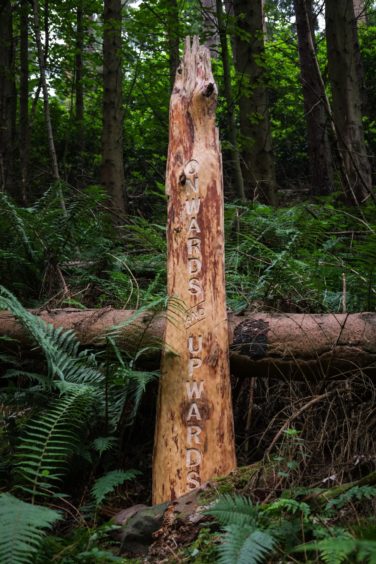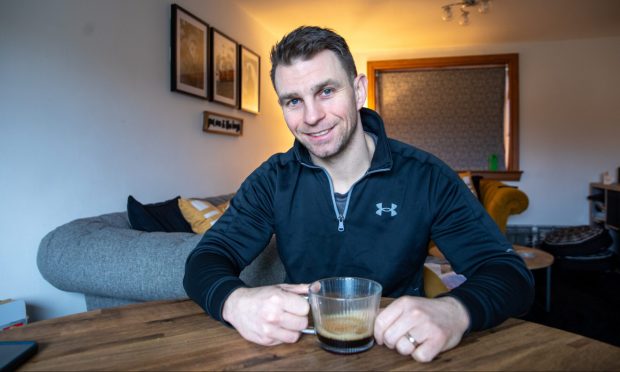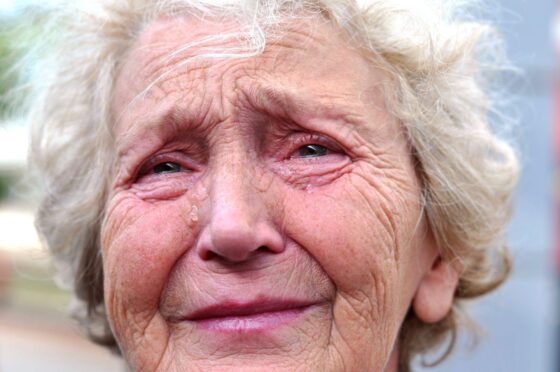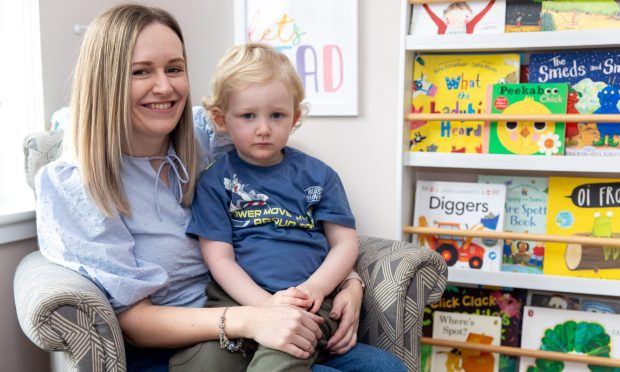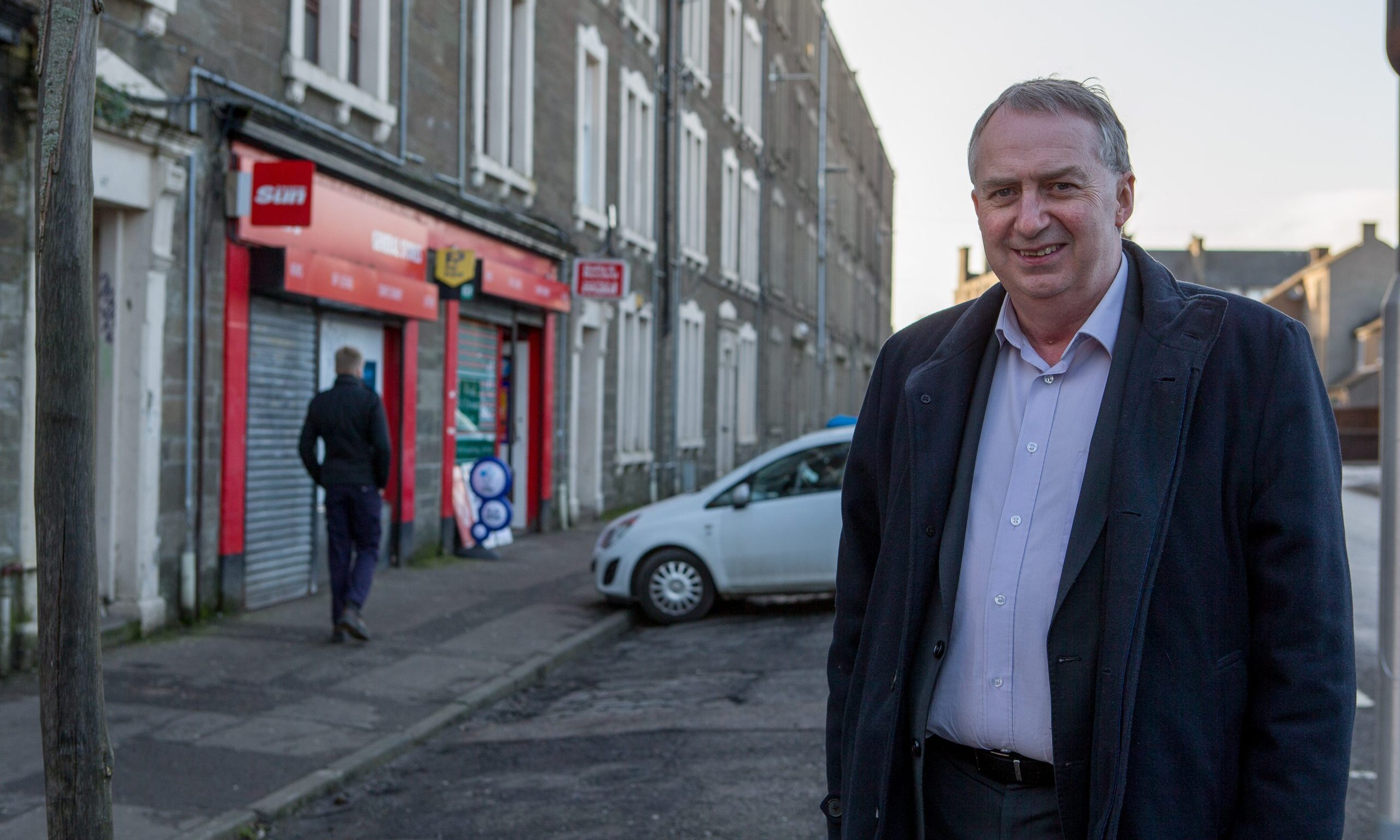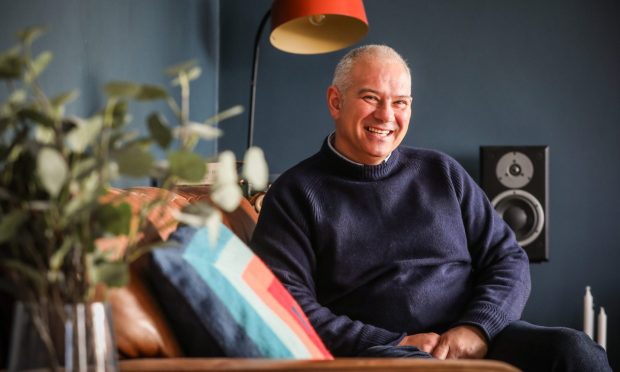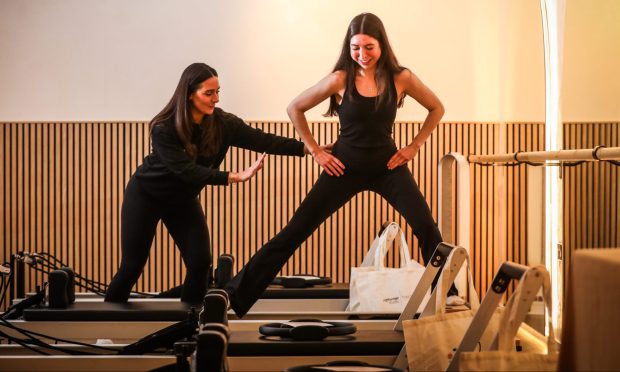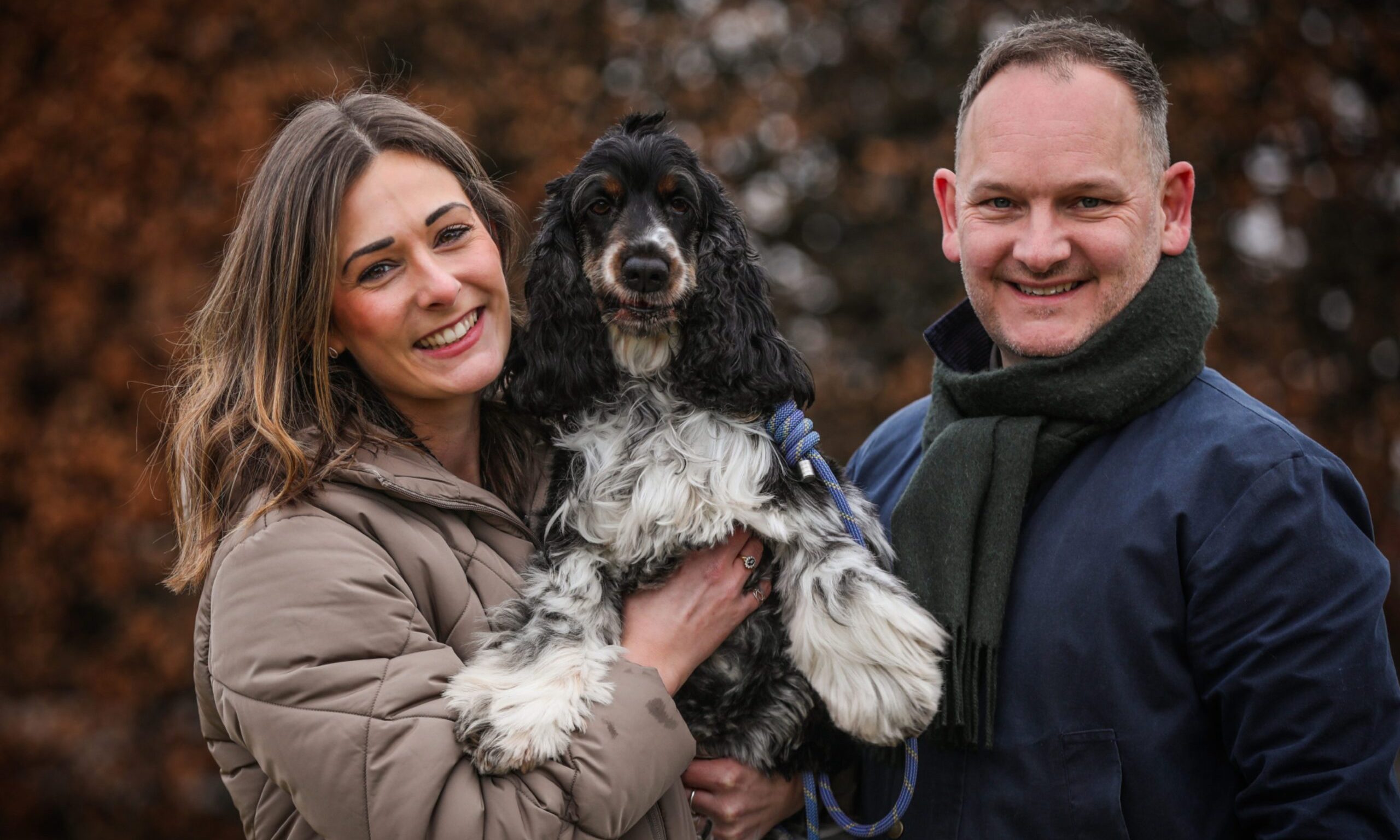Lesley Acheson and Sebastian Chaloner spent hours crafting their recently launched visual art project and they hope as many people as possible will immerse themselves in it.
However, the Auchtermuchty-based couple will be equally delighted to see their hard graft decay into oblivion.
The Trail of Thought is a meandering journey of typographic carvings, designed to encourage mindfulness and celebrate the Falkland Estate landscape.
It was commissioned recently by Fife Contemporary and resulted in writer/actor Lesley and artist/designer Sebastian creating six artworks which are now hidden on the estate over approximately 7km (4.5 miles).
The idea is that walkers can come across the creations hidden within the various routes, up and around the Temple of Decision, one of the estate’s iconic landmarks.
Way-marker posts bearing a QR code tell visitors when they’re close to an artwork. The QR codes also gives access to a website with a map and lots of information about the project. An audio guide is also available.
The artworks are carved from wind-fallen timber and officially run until the end of September when the way-markers will be removed.
However, the couple, who settled in Auchtermuchty during lockdown, think it’s very apt that the artworks will then be left to return to nature.
Biodegradable
“I think there’s an interesting aspect to that – just creating a piece of biodegradable artwork that won’t last forever,” says Sebastian, a visual artist and graphic designer from Wales, who works as a lecturer at Hertfordshire University.
“I think sometimes we think of art as a piece of work that will last forever. There’s a whole job in conservation where people aim to keep paintings alive as long as possible.
“But I think we just like the idea of making something and letting nature almost take it back. There’s a beauty in that I think.”
Northern Ireland-raised Lesley, whose family moved to Auchtermuchty 20 years ago, explained that as regular visitors to Falkland Estate, they had always enjoyed exploring the hidden paths and natural delights to be found within the shadow of the Lomond Hills.
When contemplating their ideas for the project, they went out to explore the estate for inspiration, finding themselves deep in discussion and wandering towards the estate’s ruined Temple of Decision where they stopped, took stock and found themselves gaining perspective on how they might approach the project.
Lesley, an Edinburgh University music graduate who concentrated on the “words” side of the art, explains they were intrigued by the thought behind the Temple – the care that had gone into its design and placement, and the idea of having a place to stop and consider life.
One of its two creators, Onesiphorus Tyndall Bruce, is commemorated by the Tyndall Bruce Monument on nearby Black Hill.
Designed by Alexander Roos in 1849 and built by George Page, a local mason, the Temple was built for the wealthy estate owners, Margaret and Onesiphorus Tyndall Bruce as a summerhouse with spectacular views.
It was built as a focal point in the landscape and could be viewed from the principal rooms in the House of Falkland. The plan of the Temple was derived from the Temple of Theseus in Athens.
Inspired by this, Lesley and Sebastian honed in on the idea of the perspective gained by ruminating whilst being outside and enjoying getting lost in the estate – a way of putting everything in its rightful place, particularly after the bombshell of the pandemic.
Falkland Estate has seen similar projects over the years including After the Storm, where artworks were created on fallen trees after a huge storm in 2012. Sebastian explains that this project tapped into a similar ethos.
“It’s essentially going to the space and utilising what’s around you almost in a way of respecting the environment,” says Sebastian.
“Another part of the project was about bringing people to that space.
“There’s a whole culture of forest bathing – it’s very hippy – and how going around green spaces can improve your mental health.
“One of the big things for both of us was that Covid was such a horrible time for so many people and we wanted to make a creative project where people could go to a green space and almost kind of be mindful in a way.
“The inspiration came from the Temple of Decision, but also the pandemic.
“Everyone in lockdown has had this new perspective on life. Lots of people are making big life changes. We have made a big life change where we moved up to Auchtermuchty and we fell in love with the place and the locals here.
“It’s given us another opportunity to communicate that perspective that so many people have had over lockdown.”
Practical element
Lesley said there was also a practical element with regards life on the estate.
Maspie Den, which runs up the hill between the East and West Lomonds, has been a popular attraction over the years.
But with the path having to be closed due to erosion and footfall issues, the project has also been an opportunity to guide people towards alternative trails.
At the time of this interview, more than 400 people had scanned the QR codes, with lots of people taking pictures – including someone who even took their cat for a walk on a lead!
Lesley said the pieces were created at the Woodland Hub on Falkland Estate, which is in Chancefield near Pillars of Hercules.
After so much isolation during the pandemic, one of the beauties was people wandering past and coming up to speak.
“People were fantastically nosey!” laughs Lesley.
In terms of deciding which words to write in the wood, Lesley said there was a long list of potentials.
Sometimes it was driven by the words and how they fitted in the landscape but sometimes it was more about the size of the log they had.
They also wanted the words to be “quite playful and nothing too serious or whimsical”.
“A good example of that is It’ll Blow Over,” says Sebastian.
“It’s slightly tongue in cheek because it’s a tree that’s already fallen over. Thinking about Covid, I think there’s this kind of positive way that eventually it will all kind of blow over.
“Everyone has to stay positive as best as possible. Another one was Speculate to accumulate – that was about speculation and the importance of just stopping and thinking about what you really have.
“I think a lot of people have done that with loved ones and stuff during lockdown.
“The more obvious ones – Good wood, Good mood – I think we love the idea of wood and mood and the reflective nature of those two words.
“You can be in quite a grumpy mood and then have a little walk around the woods and it transforms you, gives you peace.”
Choice of wood
Another vital consideration though was the choice of wood itself.
While the natural materials and windfall from the estate will eventually be taken back by nature, when using hand tools to carve, they had to ensure the wood was not too rotten.
While some were carved in situ, others, where possible, were dragged to the Woodland Hub.
“It was like the Highland Games!” laughs Sebastian, who says both he and Lesley got “many blisters” and were grateful to the Auchtermuchty health centre for fixing up a few cuts.
“Sometimes we’d be like ‘this fallen tree is perfect’, then you’d start carving into it and get 2cm down and it would completely rotten.
“There was that working with what you had – for example with It’ll Blow Over, it’s so rotten when you get up close. We had to be so careful when slicing it that the letters had to be perfectly made. One foul move and it would have crumbled apart. It was dynamic in that way.”
It also aims to change perception. Excited by the wood breaking down and becoming an important part of the forest ecosystem gives the example of a fallen tree being like a “blank canvas”.
“The beautiful bark on it, the root system – it pointed towards the idea that this beautiful thing had fallen over and died and actually at first look it’s a negative thing,” he says.
“But look again and it’s a positive thing – it’ll break down and obviously become part of the eco-system, fungus and mould and insects will make use of it.”
Collaborations
Looking to the future, Sebastian is about to start an MA in Design for Change at Edinburgh University.
He’s fascinated to see where his creative practice can go in terms of issues like climate change.
Lesley, meanwhile, is currently working with Vanishing Point Theatre in Glasgow – developing ideas around theatre and running and using outdoor natural spaces as a stage.
Despite the risk of arguments being a couple, they agree they “collaborated pretty well” on the project and haven’t ruled put working together on other projects in future.
